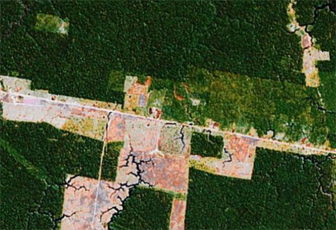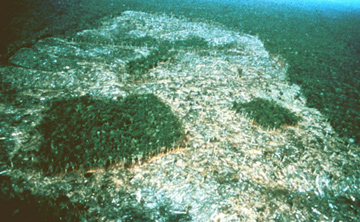Scientists demand Brazil suspend Amazon colonization project
Scientists demand Brazil suspend Amazon colonization project
mongabay.com
August 27, 2007
A group of prominent scientists has called upon Brazil to declare an immediate moratorium on a proposed forest colonization project that threatens one of the world’s largest and long-running ecological experiments.
The Association for Tropical Biology and Conservation (ATBC), the largest scientific organization devoted to the study and wise use of tropical ecosystems, issued the statement in response to plans by Brazil’s SUFRAMA agency to settle “many thousands” of people in critical Amazon rainforest study sites that are part of the Biological Dynamics of Forest Fragments Project (BDFFP). The experiment, launched outside the Brazilian city of Manaus more than 25 years ago, has helped researchers understand the impacts of deforestation and fragmentation on the complex ecology of the world’s largest and most biodiverse rainforest.
High stakes for science and conservation
“The stakes are very high,” said William Laurance, a member of ATBC and a researcher at the Smithsonian Tropical Research (STRI). “It’s not just the fragmentation project that’s threatened but also other scientific sites operated by Brazilian and other organizations, as well as critical conservation areas in the region.”

A fragment of forest surrounded by cleared areas in the Amazon near Manaus. Image courtesy of Google Earth |
The scientists say the plans include at least six colonization projects within the BDFFP study area and would likely imperil other important scientific study areas in the region, including key sites operated by Brazil’s National Institute for Amazonian Research (INPA) and other groups. Parks and indigenous reserves are also at risk.
“The Central Amazonian Conservation Corridor, one of the most important networks of protected and indigenous lands in the Amazon, will also certainly suffer as a direct result of SUFRAMA-sponsored forest-colonization activities,” stated the ATBC resolution. “The forests of central Amazonia are of exceptional conservation significance, and sustain among the highest species diversities of trees, birds, mammals, reptiles, amphibians, and invertebrates in the world.”
It is this diversity, notes ATBC, that has helped launch the careers of more than 120 Brazilian scientists.
Little to gain from colonization
“There is really not much to be gained economically from these colonization projects, and there is so much to lose,” said Thomas Lovejoy, President of the Heinz Center for Science, Economics and the Environment in Washington, D.C., who conceived and helped to establish the fragmentation project more than 25 years ago. “In fact, the results of the science we’re doing could be more profitable for Brazil. Intact forests could have great economic value in the long term for the purpose of stabilizing global climate and for conserving biodiversity.”
“The economic benefits of settling small-scale farmers in the central Amazon is extremely limited, given the notoriously poor and acidic soils in the region,” read the ATBC resolution. “Given the low agricultural productivity and remoteness of the region, small-scale farmers in central Amazonia are barely able to achieve sustainable, subsistence-livelihoods, and frequently live in disease-ridden areas far from medical facilities, schools, stores, public transportation, and other important services.”

Aerial photo of the BDFFP, taken by Dr. Rob Bierregaard |
The scientists say that SUFRAMA, which manages a large expanse of the central Amazon, has also failed to issue an environmental impact assessment on the project.
“In 2005 SUFRAMA sponsored a detailed Ecological and Economic Zoning (ZEE) plan of the extensive region in central Amazonia under its control, but has failed to release this document for public use and comment, despite the fact that it was paid for using public funds,” the ATBC said. “Many of the SUFRAMA-sponsored colonization projects are almost certainly in contravention of the unreleased ZEE plan, given that it was designed to rationalize land-use in the central-Amazonian region and to protect key scientific and conservation sites.”
Call for an immediate moratorium
Given the circumstances, ATBC says that SUFRAMA should immediately declare a three year moratorium on its ongoing and planned forest-colonization projects.
In addition, the scientists urge the development agency to “release the critical ZEE report immediately, for formal public comment and consultation” and “consult closely with leading scientific and resource-management organizations in central Amazonia… regarding its planned forest-colonization activities.” The group says that SUFRAMA should “recommence forest-colonization projects only after the Brazilian public, and relevant scientific and resource-management organizations in Amazonia, have had an opportunity to comment fully on its proposed development plans.” ATBC adds that SUFRAMA should “commit to consult with the Brazilian public and with key scientific and environmental stakeholders in Amazonia before any future land-use decisions are made or implemented within the central-Amazonian lands under its control.”
“We are hoping that SUFRAMA can partner with us to help promote a real vision for sustainable development in the central Amazon,” said Regina Luizão of Brazil’s National Institute for Amazonian Research. “We believe that economic progress can proceed without causing irreversible harm to science and the environment.”
Related articles
Primatologist freed but questions remain for Brazil after “attack on science”.
While primatologist Dr. Marc van Roosmalen has been freed from prison pending appeal, prominent scientists had stinging criticism for the Brazilian government over its increasingly “hostile” treatment of researchers. Before Roosmalen was released Tuesday, some scientists even threatened “civil disobedience,” according to a report in the journal Nature.
Longest-running Amazon rainforest experiment imperiled by colonization.
One of the world’s most important and longest-running scientific experiments is under threat by new colonization proposed by the Brazilian government, warn researchers writing in the journal Nature. The Biological Dynamics of Forest Fragments Project, an experiment launched outside the Brazilian city of Manaus more than 25 years, has helped researchers understand the impacts of deforestation and fragmentation on the complex ecology of the world’s largest and most biodiverse rainforest: the Amazon. But now a colonization scheme sanctioned by the Brazilian federal agency SUFRAMA threatens to undermine the basis for decades of critical research.
Land reform agency sanctions logging in Amazon rainforest park.
Under the guise of a sustainable development scheme, a Brazilian land agency has granted large tracts of Amazon rainforest to colonists who quickly resold the forest to loggers, alleges a new report from Greenpeace. Some of the concessions were in the Amazon National Park, a national park.
This article is based on the ATBC resolution and an earlier mongabay.com article.